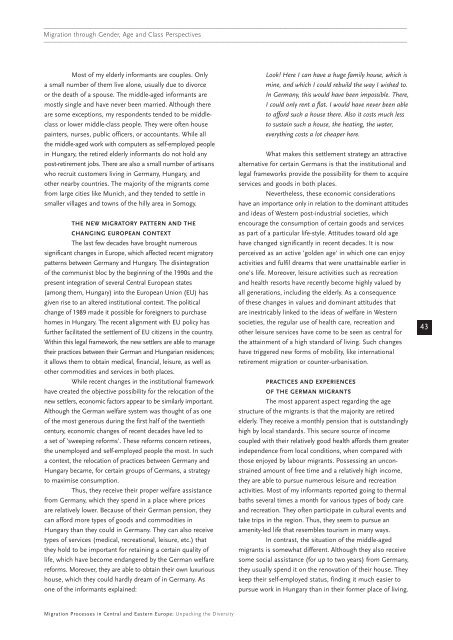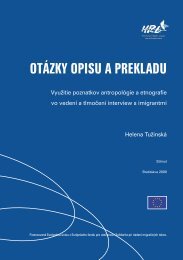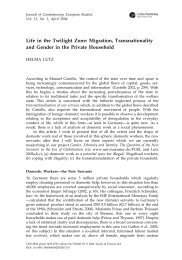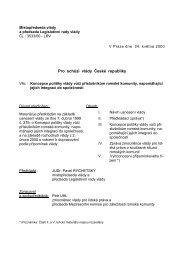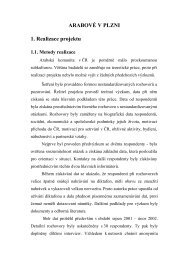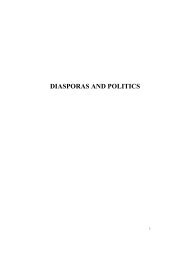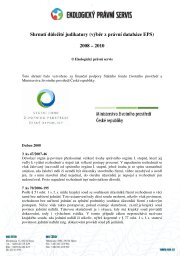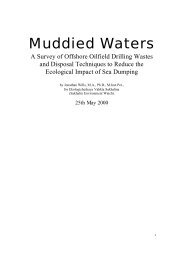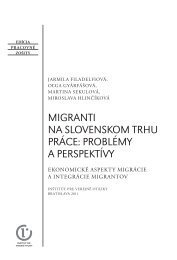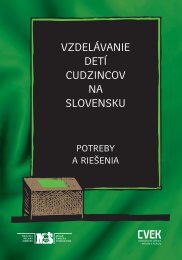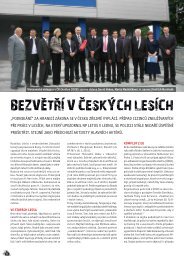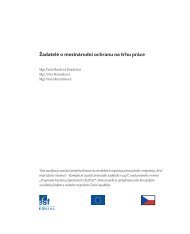Migration Processes in Central and Eastern Europe - Multiple Choices
Migration Processes in Central and Eastern Europe - Multiple Choices
Migration Processes in Central and Eastern Europe - Multiple Choices
You also want an ePaper? Increase the reach of your titles
YUMPU automatically turns print PDFs into web optimized ePapers that Google loves.
———————————————————————————————————————————————————————————————<br />
<strong>Migration</strong> through Gender, Age <strong>and</strong> Class Perspectives<br />
———————————————————————————————————————————————————————————————<br />
Most of my elderly <strong>in</strong>formants are couples. Only<br />
a small number of them live alone, usually due to divorce<br />
or the death of a spouse. The middle-aged <strong>in</strong>formants are<br />
mostly s<strong>in</strong>gle <strong>and</strong> have never been married. Although there<br />
are some exceptions, my respondents tended to be middleclass<br />
or lower middle-class people. They were often house<br />
pa<strong>in</strong>ters, nurses, public officers, or accountants. While all<br />
the middle-aged work with computers as self-employed people<br />
<strong>in</strong> Hungary, the retired elderly <strong>in</strong>formants do not hold any<br />
post-retirement jobs. There are also a small number of artisans<br />
who recruit customers liv<strong>in</strong>g <strong>in</strong> Germany, Hungary, <strong>and</strong><br />
other nearby countries. The majority of the migrants come<br />
from large cities like Munich, <strong>and</strong> they tended to settle <strong>in</strong><br />
smaller villages <strong>and</strong> towns of the hilly area <strong>in</strong> Somogy.<br />
THE NEW MIGRATORY PATTERN AND THE<br />
CHANGING EUROPEAN CONTEXT<br />
The last few decades have brought numerous<br />
significant changes <strong>in</strong> <strong>Europe</strong>, which affected recent migratory<br />
patterns between Germany <strong>and</strong> Hungary. The dis<strong>in</strong>tegration<br />
of the communist bloc by the beg<strong>in</strong>n<strong>in</strong>g of the 1990s <strong>and</strong> the<br />
present <strong>in</strong>tegration of several <strong>Central</strong> <strong>Europe</strong>an states<br />
(among them, Hungary) <strong>in</strong>to the <strong>Europe</strong>an Union (EU) has<br />
given rise to an altered <strong>in</strong>stitutional context. The political<br />
change of 1989 made it possible for foreigners to purchase<br />
homes <strong>in</strong> Hungary. The recent alignment with EU policy has<br />
further facilitated the settlement of EU citizens <strong>in</strong> the country.<br />
With<strong>in</strong> this legal framework, the new settlers are able to manage<br />
their practices between their German <strong>and</strong> Hungarian residences;<br />
it allows them to obta<strong>in</strong> medical, f<strong>in</strong>ancial, leisure, as well as<br />
other commodities <strong>and</strong> services <strong>in</strong> both places.<br />
While recent changes <strong>in</strong> the <strong>in</strong>stitutional framework<br />
have created the objective possibility for the relocation of the<br />
new settlers, economic factors appear to be similarly important.<br />
Although the German welfare system was thought of as one<br />
of the most generous dur<strong>in</strong>g the first half of the twentieth<br />
century, economic changes of recent decades have led to<br />
a set of 'sweep<strong>in</strong>g reforms'. These reforms concern retirees,<br />
the unemployed <strong>and</strong> self-employed people the most. In such<br />
a context, the relocation of practices between Germany <strong>and</strong><br />
Hungary became, for certa<strong>in</strong> groups of Germans, a strategy<br />
to maximise consumption.<br />
Thus, they receive their proper welfare assistance<br />
from Germany, which they spend <strong>in</strong> a place where prices<br />
are relatively lower. Because of their German pension, they<br />
can afford more types of goods <strong>and</strong> commodities <strong>in</strong><br />
Hungary than they could <strong>in</strong> Germany. They can also receive<br />
types of services (medical, recreational, leisure, etc.) that<br />
they hold to be important for reta<strong>in</strong><strong>in</strong>g a certa<strong>in</strong> quality of<br />
life, which have become endangered by the German welfare<br />
reforms. Moreover, they are able to obta<strong>in</strong> their own luxurious<br />
house, which they could hardly dream of <strong>in</strong> Germany. As<br />
one of the <strong>in</strong>formants expla<strong>in</strong>ed:<br />
Look! Here I can have a huge family house, which is<br />
m<strong>in</strong>e, <strong>and</strong> which I could rebuild the way I wished to.<br />
In Germany, this would have been impossible. There,<br />
I could only rent a flat. I would have never been able<br />
to afford such a house there. Also it costs much less<br />
to susta<strong>in</strong> such a house, the heat<strong>in</strong>g, the water,<br />
everyth<strong>in</strong>g costs a lot cheaper here.<br />
What makes this settlement strategy an attractive<br />
alternative for certa<strong>in</strong> Germans is that the <strong>in</strong>stitutional <strong>and</strong><br />
legal frameworks provide the possibility for them to acquire<br />
services <strong>and</strong> goods <strong>in</strong> both places.<br />
Nevertheless, these economic considerations<br />
have an importance only <strong>in</strong> relation to the dom<strong>in</strong>ant attitudes<br />
<strong>and</strong> ideas of Western post-<strong>in</strong>dustrial societies, which<br />
encourage the consumption of certa<strong>in</strong> goods <strong>and</strong> services<br />
as part of a particular life-style. Attitudes toward old age<br />
have changed significantly <strong>in</strong> recent decades. It is now<br />
perceived as an active 'golden age' <strong>in</strong> which one can enjoy<br />
activities <strong>and</strong> fulfil dreams that were unatta<strong>in</strong>able earlier <strong>in</strong><br />
one's life. Moreover, leisure activities such as recreation<br />
<strong>and</strong> health resorts have recently become highly valued by<br />
all generations, <strong>in</strong>clud<strong>in</strong>g the elderly. As a consequence<br />
of these changes <strong>in</strong> values <strong>and</strong> dom<strong>in</strong>ant attitudes that<br />
are <strong>in</strong>extricably l<strong>in</strong>ked to the ideas of welfare <strong>in</strong> Western<br />
societies, the regular use of health care, recreation <strong>and</strong><br />
other leisure services have come to be seen as central for<br />
the atta<strong>in</strong>ment of a high st<strong>and</strong>ard of liv<strong>in</strong>g. Such changes<br />
have triggered new forms of mobility, like <strong>in</strong>ternational<br />
retirement migration or counter-urbanisation.<br />
PRACTICES AND EXPERIENCES<br />
OF THE GERMAN MIGRANTS<br />
The most apparent aspect regard<strong>in</strong>g the age<br />
structure of the migrants is that the majority are retired<br />
elderly. They receive a monthly pension that is outst<strong>and</strong><strong>in</strong>gly<br />
high by local st<strong>and</strong>ards. This secure source of <strong>in</strong>come<br />
coupled with their relatively good health affords them greater<br />
<strong>in</strong>dependence from local conditions, when compared with<br />
those enjoyed by labour migrants. Possess<strong>in</strong>g an unconstra<strong>in</strong>ed<br />
amount of free time <strong>and</strong> a relatively high <strong>in</strong>come,<br />
they are able to pursue numerous leisure <strong>and</strong> recreation<br />
activities. Most of my <strong>in</strong>formants reported go<strong>in</strong>g to thermal<br />
baths several times a month for various types of body care<br />
<strong>and</strong> recreation. They often participate <strong>in</strong> cultural events <strong>and</strong><br />
take trips <strong>in</strong> the region. Thus, they seem to pursue an<br />
amenity-led life that resembles tourism <strong>in</strong> many ways.<br />
In contrast, the situation of the middle-aged<br />
migrants is somewhat different. Although they also receive<br />
some social assistance (for up to two years) from Germany,<br />
they usually spend it on the renovation of their house. They<br />
keep their self-employed status, f<strong>in</strong>d<strong>in</strong>g it much easier to<br />
pursue work <strong>in</strong> Hungary than <strong>in</strong> their former place of liv<strong>in</strong>g.<br />
43<br />
<strong>Migration</strong> <strong>Processes</strong> <strong>in</strong> <strong>Central</strong> <strong>and</strong> <strong>Eastern</strong> <strong>Europe</strong>: Unpack<strong>in</strong>g the Diversity


